unit1Where did you go on vacation复习总结
人教版英语八年级上第一单元Unit1Wheredidyougoonvacation知识点梳理

人教版英语八年级上第一单元Unit1Wheredidyougoonvacation知识点梳理Unit 1 Where did you go on vacation?知识梳理一、词型转换Section A1.wonder →(adj.) wonderful2.I →(反身代词) myself3.you →(反身代词) yourself4.yourself →(pl.) yourselves5.seem →(pt.) seemedSection B1.activity →(pl.) activities2.decide →(n.) decision3.try →(pt.) tried4.bike →(同义词) bicycle5.build →(n.) building6.difference →(adj.) different7.like →(反义词) dislike8.below →(反义词) above二、短语归纳Section A1.go to Central Park 去中央公园2.on vacation 在度假3.buy something special 买特别的东西4.meet someone interesing 遇见有趣的人5.go out with someone 和某人一起出去6.take quite a few photos 拍相当多的照片7.most of the time 大多数时间8.go shopping 去购物9.keep a diary 记日记10.of course 当然;自然Section B1.have a good time 玩得高兴;过得愉快2.go to the beach 去海滩3.feel like 感觉像4.the houses of the Chinese traders 中国商人的房子5. a lot of new buildings 许多新的建筑物6.in the past 在过去7.over an hour 一个多小时8.too many people 太多的人9.get to the top 到达顶部10.because of the bad weather 因为不好的天气11.one bowl of fish 一碗鱼肉12.another two hours 另外两个小时13.the top of the hill 山顶14.learn something important 学习重要的东西Self Check1.go to the countryside 去乡下2.in the shopping center 在购物中心3.have a fun time 玩得高兴;过得愉快4.after three hours 三个小时以后5.keep going 一直走6.twenty minutes later 20分钟后重点句子1.Where did you go on vacation?你去哪儿度假的?2.Long time no see.好久不见。
Unit 1 Where did you go on vacation知识点
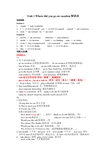
Unit 1 Where did you go on vacation知识点词型转换Section A1.wonder →(adj.) wonderful2.I →(反身代词) myself you →(反身代词) yourself yourself →(pl.) yourselves3.seem →(pt.) seemed try →(pt.) triedSection B1.activity →(pl.) activities difference →(adj.) different2.decide →(n.) decision build →(n.) building trade →(n.) trader3.excite→(adj.) exciting/excited →(n.) excitement enjoy→(adj.)enjoyable4.like →(反义词) dislike below →(反义词) above5.bike →(同义词) bicycle词组大归纳Section A1a1.关于活动的词组:go on vacation去度假(强调动作) be on vacation在度假(强调状态)stay at home在家go out with someone 和某人一起出去go to mountains去爬山go to New York City 去纽约城go to the beach去沙滩go to summer camp 去夏令营visit relatives 拜访亲属visit museums 参观博物馆visit还可以作名词“拜访,参观”,构成短语pay a visit to…/be on a visit to…译为“访问(某人)”“参观(某地)”1.keep a diary 写日记play volleyball 打排球of course 当然;自然1. buy something special 买一些特别的东西meet someone interesting 遇见有趣的人2. study for a test/tests 备考study to do sth学习做某事study by oneself =learn by oneself= teach oneself自学2d1.交际用语:1)Long time no see.好久不见2) Nice to meet you.很高兴见到你3) Excuse me.劳驾4)表示建议的几种:How about doing sth?……如何?Shall we do sth?我们能….吗?Let’s do sth.咱们去…. why not +do sth?为什么不做……?Would you like sth?你想要….吗Yes, please./No, thanks.是的,来一点/不,谢谢Would you like to do sth?你想要做…..吗?Yes, I’d love to./ I’d love to, but….是的我愿意/我愿意,但……2. last month 上个月last year 去年next month 下个月next year 明年句中有last+名词出现时用一般过去式,有next +名词出现时用一般将来时。
(完整版)新人教版八年级英语上册unit1知识点总结

Unit 1 where did you go on vacation ➢单词复习:任何人Anywhere 精彩的;极好的最多的;大多数的没有什么n.没有。
每人;人人.我自己你自己;你亲自hen pig似乎;好像无聊的;厌烦的;郁闷的Someone Diary 活动;活跃。
决定;选定Paragliding bird bicycle building trader惊奇;想知道;怀疑差异;不同顶部;顶等;等待湿的;雨天的低于;在。
..下面饥饿的;渴望的如同;像.。
一样HillDuck不喜欢;厌恶短语归纳1、go on vacation去度假 ,2、stay at home 呆在家,3、go to the mountains 上山/进山,4、go to the beach到海边去,5、visit museums 参观博物馆,6、go to summer camp 去夏令营,7、quite a few 相当多,8、study for为……学习,9、go out 出去,10、most of the time 大部分时间/绝大多数时间,11、taste good 尝起来味道好,12、have a good time玩的开心,13、of course当然可以,14、feel like(doing sth)感觉像……/想要,15、go shopping购物,16、in the past 在过去,17、walk around绕……走,18、too many 太多(可数名词前面),19、because of 因为,20、one bowl of 一碗……,21、find out 查出来/发现,22、go on继续,23、take photos 照相,24、something important重要的事情,25、up and down上上下下,26、come up出来➢习惯用法、搭配1. buy sth。
for sb.=buy sb. sth。
Unit 1 Where did you go on vacation知识点归纳及练习
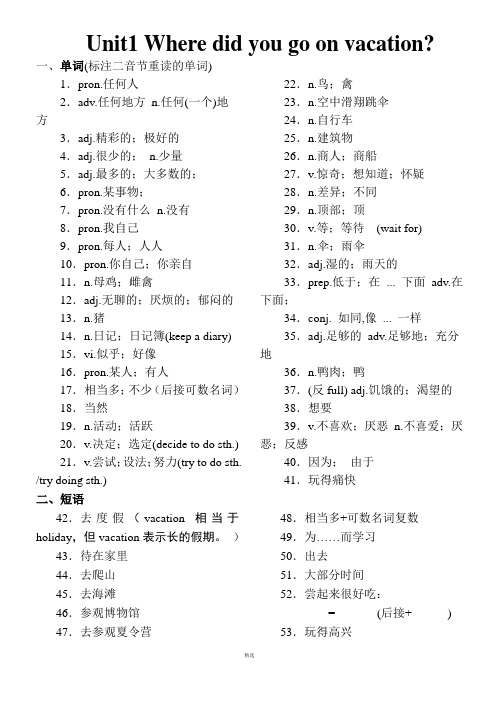
Unit1 Where did you go on vacation?一、单词(标注二音节重读的单词)1.pron.任何人2.adv.任何地方n.任何(一个)地方3.adj.精彩的;极好的4.adj.很少的;n.少量5.adj.最多的;大多数的;6.pron.某事物;7.pron.没有什么n.没有8.pron.我自己9.pron.每人;人人10.pron.你自己;你亲自11.n.母鸡;雌禽12.adj.无聊的;厌烦的;郁闷的13.n.猪14.n.日记;日记簿(keep a diary)15.vi.似乎;好像16.pron.某人;有人17.相当多;不少(后接可数名词)18.当然19.n.活动;活跃20.v.决定;选定(decide to do sth.)21.v.尝试;设法;努力(try to do sth. /try doing sth.)22.n.鸟;禽23.n.空中滑翔跳伞24.n.自行车25.n.建筑物26.n.商人;商船27.v.惊奇;想知道;怀疑28.n.差异;不同29.n.顶部;顶30.v.等;等待(wait for)31.n.伞;雨伞32.adj.湿的;雨天的33.prep.低于;在... 下面adv.在下面;34.conj. 如同,像... 一样35.adj.足够的adv.足够地;充分地36.n.鸭肉;鸭37.(反full) adj.饥饿的;渴望的38.想要39.v.不喜欢;厌恶n.不喜爱;厌恶;反感40.因为;由于41.玩得痛快二、短语42.去度假(vacation相当于holiday,但vacation表示长的假期。
)43.待在家里44.去爬山45.去海滩46.参观博物馆47.去参观夏令营48.相当多+可数名词复数49.为……而学习50.出去51.大部分时间52.尝起来很好吃:= (后接+ ) 53.玩得高兴54.当然55.给……的感觉;感受到:(后接+ )56.去购物57.在过去58.四处走走59.一碗…… 60.喝茶61.找出;查明62.继续63.去旅行64.照相65.上上下下66.出来;出版三、重点句式1.你买特别的东西了吗?Did you buy ?2.所有的东西尝起来真的很好吃!Everything tasted !3.你去哪里度假了?4.我为爸爸买了一些东西。
Unit1 where did you go on vacation 知识点总结

Unit1 知识点精讲精练一、重点短语go on vacation去度假stay at home待在家里go to the mountains去爬山go to the beach去海滩visit museums 参观博物馆go to summer camp去参观夏令营quite a few相当多study for为……而学习go out出去most of the time大部分时间taste good尝起来很好吃have a good time玩得高兴of course当然feel like给……的感觉;感受到go shopping去购物in the past在过去walk around四处走走because of因为one bowl of… 一碗……the next day第二天drink tea喝茶find out找出;查明go on继续something important重要的事up and down上上下下come up出来take photos照相二、句型集萃buy sth. for sb. / buy sb. sth.为某人买某物taste + adj. 尝起来……seem+(to be)+ adj. 看起来……keep doing sth.继续做某事arrive in+大地点/ arrive at+小地点到达某地tell sb. (not) to do sth. 告诉某人(不要)做某事try doing sth.尝试做某事/ try to do sth.尽力去做某事decide to do sth.决定去做某事forget doing sth.忘记做过某事/forget to do sth.忘记做某事enjoy doing sth.喜欢做某事want to do sth.想去做某事stop doing sth. 停止做某事dislike doing sth. 不喜欢做某事Why not do. sth.?为什么不做……呢?so+adj.+that 如此……以至于……look+adj. 看起来……start doing sth.开始做某事三:重点句子1:Where did you go on vacation? 你去哪里度假了呢?2:Did you go with anyone?你和别人一起去了吗?3:Did you do anything special? 你做了什么特别的事情么?4:How was the food? 食物怎么样?5:Everything tasted really good! 所有的东西尝起来真的好好吃!6:The only problem was that there was nothing much to do in the evening but read. 唯一的问题是在晚上没什么事情可做除了读书7:No one seemed to be bored.没人似乎很无聊8:I felt like I was a bird我感觉我是一只鸟9:I really enjoyed walking around the town.10:And because of the bad wea ther, we couldn’t see anything below.11:My legs were so tired that I wanted to stop.。
unit-1-Where-did-you-go-on-vacation知识总结
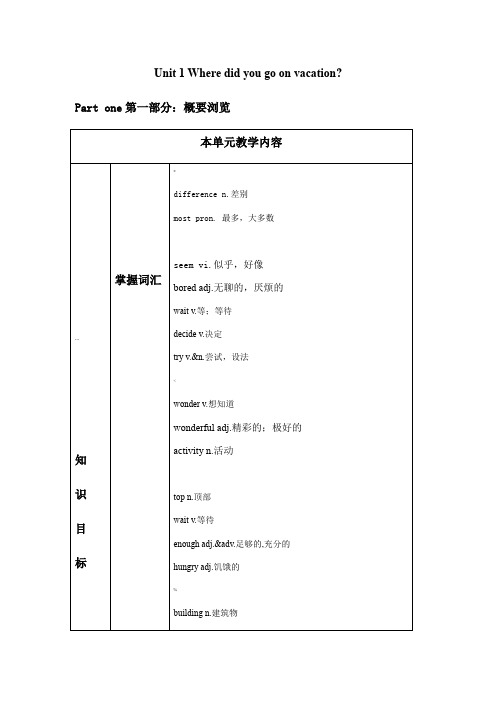
Unit 1 Where did you go on vacation? Part one第一部分:概要浏览)Part two 第二部分;知识点详解单词与短语讲解(一)quite a few的用法a few 意为“一些,若干(=some)”,后跟可数名词复数形式。
quite a few 意为“相当多;不少(=many)”后跟可数名词复数形式。
We took ____ ____ _____ _____ in the park last weekend.上周末,我们在公园里拍了相当多的照片。
【拓展】:few/a few/quite a few/little/a little/quite a little的用法1.most + 名词泛指多数,无范围most students大部分学生2.most + of + the (this/that/those/these等)+名词,指某一范围内的多数。
______ _____ _______students go to school by bike.这些学生们中的多数骑自行车去上学。
;(三)seem的用法seem“好像”,既可以后跟___________,又可以后跟___________。
【活学活用】1.The pig seems ___________(healthy/ healthily).2.Tom seemed ___________(know/ to know) the test result.3.I seem__________(have)a cold【拓展】(1.It seems+that从句看起来好像…;似乎….It seems that he is happy.=He seems _____ _____ happy. 他似乎很快乐。
2.seem like….好像,似乎…..It seems like a good idea.它似乎好像一个好主意。
Unit-1--Where-did-you-go-on-vacation-知识点汇总
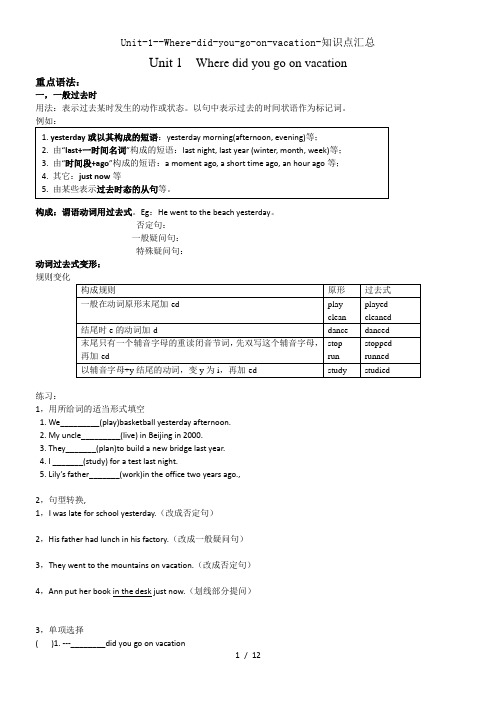
Unit 1 Where did you go on vacation 重点语法:一,一般过去时用法:表示过去某时发生的动作或状态。
以句中表示过去的时间状语作为标记词。
例如:构成:谓语动词用过去式。
Eg:He went to the beach yesterday。
否定句:一般疑问句:特殊疑问句:动词过去式变形:规则变化练习:1,用所给词的适当形式填空1. We_________(play)basketball yesterday afternoon.2. My uncle_________(live) in Beijing in 2000.3. They_______(plan)to build a new bridge last year.4. I _______(study) for a test last night.5. Lily’s father_______(work)in the office two years ago.,2,句型转换,1,I was late for school yesterday.(改成否定句)2,His father had lunch in his factory.(改成一般疑问句)3,They went to the mountains on vacation.(改成否定句)4,Ann put her book in the desk just now.(划线部分提问)3,单项选择( )1. ---________did you go on vacation---Hong Kong.A. WhatB. HowC. WhereD. When( )2. I_____my homework last night. I went to the cinema with my parents.A. didB. didn’tC. didn’t doD. don’t do( )3. ---Did they clean the house yesterday afternoon---_________. They cleaned it this morning.A. No, they don’tB. Yes, they didC. No, they didn’t C. Yes, they do( )4. ---_____Tom and Jim_____a walk yesterday evening---No, they____.A. Do; take; doesn’tB. Did; take; didn’tC. Did; take; didD. Do; take; don’t ( )5. ---The coat looks good on you. Where______you______it---In a supermarket.A. do; buyB. did; buyC. will; buyD. does; buy二、复合不定代词Did you go with anyone Did you find anything special用法:1,作主语时,谓语动词用单数Everone (be)here.2, 被形容词修饰时,形容词必需后置。
Unit_1_where_did_you_go_on_vacation知识点详解
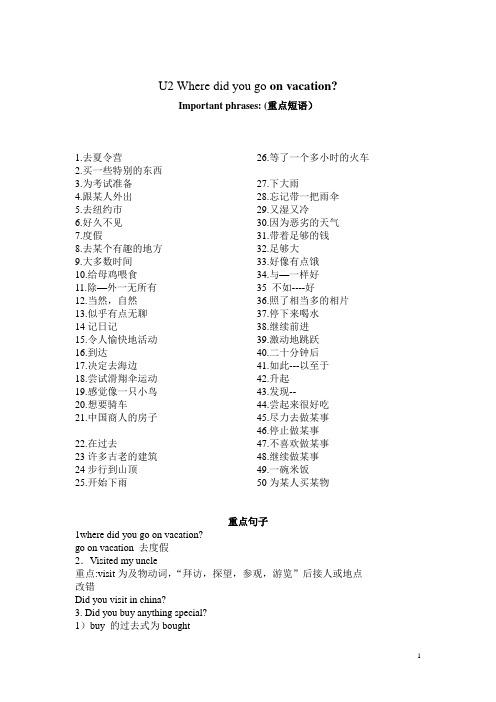
U2 Where did you go on vacation?Important phrases: (重点短语)1.去夏令营2.买一些特别的东西3.为考试准备4.跟某人外出5.去纽约市6.好久不见7.度假8.去某个有趣的地方9.大多数时间10.给母鸡喂食11.除—外一无所有12.当然,自然13.似乎有点无聊14记日记15.令人愉快地活动16.到达17.决定去海边18.尝试滑翔伞运动19.感觉像一只小鸟20.想要骑车21.中国商人的房子22.在过去23许多古老的建筑24步行到山顶25.开始下雨26.等了一个多小时的火车27.下大雨28.忘记带一把雨伞29.又湿又冷30.因为恶劣的天气31.带着足够的钱32.足够大33.好像有点饿34.与—一样好35 不如----好36.照了相当多的相片37.停下来喝水38.继续前进39.激动地跳跃40.二十分钟后41.如此---以至于42.升起43.发现--44.尝起来很好吃45.尽力去做某事46.停止做某事47.不喜欢做某事48.继续做某事49.一碗米饭50为某人买某物重点句子1where did you go on vacation?go on vacation 去度假2.Visited my uncle重点:visit为及物动词,“拜访,探望,参观,游览”后接人或地点改错Did you visit in china?3. Did you buy anything special?1)buy 的过去式为boughtbuy sth.for sb.=buy sb sth.我为Tom买了一个礼物2)anything 不定代词“某物,某事”主要用于疑问句和否定句中一旦anything用于可定句中,则意为“任何事,任何东西”Eg You can ask me anything you want to know3)★形容词修饰不定代词要后置4.Oh,did you go anything interesting?这是一般过去时中不含was/were的句子在变一般疑问句时,需用助动词did。
八年级上册英语高频考点总结
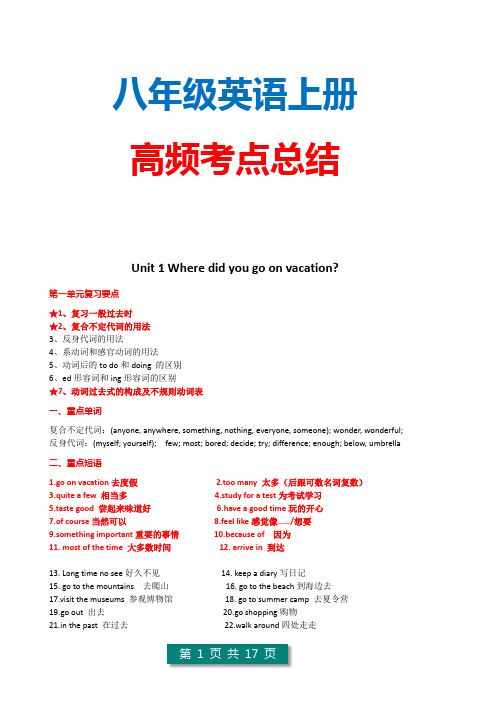
八年级英语上册高频考点总结Unit 1 Where did you go on vacation?第一单元复习要点★1、复习一般过去时★2、复合不定代词的用法3、反身代词的用法4、系动词和感官动词的用法5、动词后的to do和doing 的区别6、ed形容词和ing形容词的区别★7、动词过去式的构成及不规则动词表一、重点单词复合不定代词:(anyone, anywhere, something, nothing, everyone, someone); wonder, wonderful;反身代词:(myself; yourself); few; most; bored; decide; try; difference; enough; below, umbrella二、重点短语1.go on vacation去度假2.too many 太多(后跟可数名词复数)3.quite a few 相当多4.study for a test为考试学习5.taste good 尝起来味道好6.have a good time玩的开心7.of course当然可以8.feel like感觉像……/想要9.something important重要的事情10.because of 因为11. most of the time 大多数时间12. arrive in 到达13. Long time no see好久不见14. keep a diary写日记15. go to the mountains 去爬山16. go to the beach到海边去17.visit the museums 参观博物馆18. go to summer camp 去夏令营19.go out 出去20.go shopping购物21.in the past 在过去22.walk around四处走走23.one bowl of rice 一碗米饭24.find out 查出来/发现25.go on继续26.stay at home 呆在家27.take photos 照相28.up and down上上下下e up出来三、习惯用法、搭配1. buy sth. for sb./ buy sb. sth. 为某人买某物(sb.某人;sth.某物)★2. taste + adj. 尝起来……(adj.形容词)3. arrive in + 大地方/ arrive at + 小地方到达某地★4. decide to do sth. 决定做某事(to do表示动词不定式,就是在动词原形前加to)★5. try doing sth. 尝试做某事/ try to do sth. 尽力做某事6. enjoy doing sth. 喜欢做某事7. want to do sth. 想去做某事8. start doing sth. 开始做某事9. stop doing sth. 停止做某事10. look + adj看起来11. dislike doing sth. 不喜欢做某事12. Why not do sth. 为什么不做…….呢?13. so + adj + that + 从句如此……以至于……★14. tell sb. (not) to do sth. 告诉某人(不要)做某事15. keep doing sth. 继续做某事★16. forget to do sth. 忘记去做某事/ forget doing sth 忘记做过某事四、重点句子--Where did you go on vacation? 你到哪里去度假了?---I went to New York City.我去了纽约城--Did you go out with anyone? 你出去带人吗?--No, No one was here. Everyone was on vacation.不没有人在这儿。
Unit_1_Where_did_you_go_on_vacation?单元知识点和练习题

Unit 1 Where did you go on vacation?一、知识点1. go on (a) vacation 去度假:be on (a)vacation 在度假/take a vacation休假2. go to the mountains去爬山go the beach 去沙滩go to the summer camp 去夏令营3.go+V-ing意为“去…”,多用于进行体育活动和业余娱乐活动,总结:go shopping/ go fishing/ go skating/ go swimming/ go camping/ go boating/ go hiking4. stay vi.停留,逗留,待在stay at home待在家里/ stay up (late)深夜不睡/熬夜5. most pron.大多数Most of后面的名词前要用冠词,人称代词用宾格;做主语时,of后的名词是复数,后面的谓语动词用复数;of后的名词是单数,后面的谓语动词用单数,如:Most of us like learning English. Most of the apples are delicious. / Most of the apple is bad.6. buy sth. for sb.(=buy sb. sth.)给某人买某物,如:I bought a pair of new glasses for my mother.=7. How do you think of….?你认为……怎么样?例如:你认为这个电影/这本书/这个国家/这个故事怎么样?=what do you think of …?/How do you feel about….?8 ed 和ing 结尾的动词9. seem好像,似乎,看起来①主语+seem to do sth. Your father seems to like playing tennis very much.(变否定句)②主语+seem (to be)+adj. The classroom seems (to be) very clean.③It seems +that从句It seems that it will snow soon./ It seems that you are not happy today.10. problem大的问题,难题,需要用行动解决;question因疑惑而提出的,需要口头回答。
八年级英语上册Unit1Wheredidyougoonvacation语法总结

复合不定代词 复合不定代词是由some-,any-,no-,every-加上-one, -body,-thing等所组成的不定代词。
这些复合代词具有名词性质,在句中可用作主语、宾语或表语, 但不能用作定语。
一、复合不定代词的数 复合不定代词都具有单数的含义,因此通常被看成是第三 人称单数。当它们充当句子的主语时,其后的谓语动词用 单数形式。 二、复合不定代词的定语 形容词修饰复合不定代词必须放在不定代词的后面。 三、含some-和any-的复合不定代词间的用法区别 1.something,someone,somebody通常用于肯定句中, 而anything,anyone,anybody一般用于否定句、疑问句 或条件状语从句中。 2.在表示请求、邀请、提建议等带有委婉语气的疑问句, 和希望得到对方肯定答复的疑问句,以及表示反问的问句 中,也用something,someone,somebody等复合不定代词。
___________My__great__summer__vacation_____________ My__name__is__Wang__Lan.Every__summer__I__go__to_
天气也不错;你和爷爷去爬山、钓鱼,与堂弟去游泳,帮 助摘苹果;奶奶每天都给你做好吃的。你们过得很愉快。 请根据以上提示,以“My last summer vacation”为题 写一篇英语短文。词数在80个左右。
step 1审清题目 审题裁:记叙文 审时态:一般过去时 审人称:第一 人称 审要点:1.基本内容:时间(1分)、地点(1分)、天气 (1分)、人物(1分)及乡下的饮食与风土人情(2分);2.人 物活动(3分):爬山、钓鱼、游泳、摘苹果、做好吃的东 西;3.心情与感受(3分)。
八年级英语上册Unit 1 Where did you go on vacation-知识点归纳

八年级英语上册Unit 1 Where did you go on vacation?知识点归纳八年级英语上册Unit1wheredidyougoonvacation?知识点归纳第一单元主要点:①复习一般过去时②复合不定代词的用法③反身代词的用法④系动词的用法⑤动词后的todo和doing的区别⑥ed形容词和ing形容词的区别⑦“近义词”的区别⑧本单元中的主谓一致现象⑨动词过去式的构成及不规则动词表⑩用同义短语转换同义句时谓语动词形式一致性的培养。
⑾感叹句的结构和连词的选择。
一、词组、短语:1、goonvacation去度假,2、stayathome呆在家,3、gotothemountains上山/进山,4、gotothebeach到海边去,5、visitmuseums参观博物馆,6、gotosummercamp去夏令营,7、quiteafew相当多,8、studyfor为……学习,9、goout出去,10、mostofthetime大部分时间/绝大多数时间,11、tastegood尝起来味道好,12、haveagoodtime玩的开心,13、ofcourse当然可以,14、feellike感觉像……/想要,15、goshopping购物,16、inthepast在过去,17、walkaround绕……走,18、toomany太多(可数名词前面),19、becauseof因为,20、onebowlof一碗……,21、findout查出来/发现,22、goon继续,23、takephotos照相,24、somethingimportant重要的事情,25、upanddown上上下下,26、comeup出来二、重要句子(语法):wheredidyougoonvacation?你到哪里去度假了?IwenttoNewyorkcity.我去了纽约城Didyougooutwithanyone?你出去带人吗?No,Noonewashere.Everyonewasonvacation.不,没有人在这儿。
八上 U1 Where did you go on vacation知识梳理

Unit 1 Where did you go on vacation?知识梳理**语法归纳:一般过去时1.概念:表示过去某点发生的动作或过去的状态,常与过去的时间状语连用。
例如:yesterday, the daybefore yesterday, last +时间(last year/month/week/night), 时间+ago(two years ago/two months ago/one week ago), in 2008,in the past等。
2.谓语动词构成:(1)动词的过去式(do-did) (2)was/were(1)规则动词:一般加ed;词尾有e加d;辅音y结尾,变y为i+ed(study-studied,try-tried,stay-stayed)一辅音重读闭音节结尾,双写加ed(stop-stopped, shop-shopped)(2)不规则动词:①不变let-let put-put read-read cut-cut②遇i变a swim-swam sing-sang begin-began sit-sat give-gave drink-drank游泳唱歌后,开始坐下来,给点喝的,i就变成a, 除此i变o(drive-drove, ride-rode, write-wrote)③过去式以ought和aught结尾的单词bring-brought buy-bought think-thoughtfight-fought catch-caught teach-taught④中间去e词尾加t feel-felt keep-kept sleep-slept sweep-swept meet-met feed-fed3.句式:主+动词的过去式……(1)肯定句主+was/were…主+动词过去式…(2) 否定句主+wasn’t/weren’t…主+didn’t+动词原形(3) 一般疑问句Was/Were+主…?---Yes,...was/were. Did+主+动词原形…?---Yes,...did.No,...wasn’t/weren’t. No,...didn’t.例如:A. Mary was born in Beijing.玛丽在北京出生。
Unit 1 Where did you go on vacation?单元知识点

Unit 1 Where did you go on vacation?一、知识点1. go on (a) vacation 去度假:be on (a)vacation 在度假 /take a vacation休假2. go to the mountains去爬山3. stay vi.停留,逗留,待在 stay at home待在家里/ stay up (late)深夜不睡/熬夜4. visit v. visit+人,看望、拜访某人 visit+地点,参观、游览某地n. pay a visit to 地点,参观、拜访某地5. go (out) with sb. 跟某人一起外出6. Long time no see. 好久不见7.most pron.大多数Most of后面的名词前要用冠词,人称代词用宾格;做主语时,of后的名词是复数,后面的谓语动词用复数;of后的名词是单数,后面的谓语动词用单数,如:Most of us like learning English. Most of the apples are delicious. / Most of the apple is bad.8. buy sth. for sb.(=buy sb. sth.)给某人买某物,如:I bought a pair of new glasses for my mother.=9. How do you like….?你认为……怎么样?例如:你认为这个电影/这本书/这个国家/这个故事怎么样?=what do you think of …?/How do you feel about….?10. go+V-ing意为“去…”,多用于进行体育活动和业余娱乐活动,总结:go shopping/ go fishing/ go skating/ go swimming/ go camping/ go boating/ go hiking11.-ing形容词和-ed形容词12. feed sth./ sb.( on/with sth.) (用…)喂…例 feed the chicken on rice/ feed the baby with milk.(主语) feed on sth.(主语)以……为生/食,例: Pandas feed on bamboo. / Dogs feed on bones.13. seem好像,似乎,看起来①主语+seem to do sth. Your father seems to like playing tennis very much.(变否定句)②主语+seem (to be)+adj. The classroom seems (to be) very clean.③It seems +that从句 It seems that it will snow soon./ It seems that you are not happy today.14. problem大的问题,难题,需要用行动解决;question因疑惑而提出的,需要口头回答。
八上Unit 1 Where did you go on vacation单词短语知识点总结

五.feel like的用法: 1.feel like +句子,翻译为“感觉像”。 如:I felt like I was a bird. 2.feel like +doing, 翻译为“想干某事”。 如:I don’t feel like eating anything now. 六.because of与because的区别:because of后加 名词或名词短语;because后加句子。 如:We can’t play basketball because of the rain.=We can’t play basketball because it rains. 七.try的用法: try to do:尽力做某事,如:He tried to pass the exam. try doing:尝试做某事。如:We can try doing it in another way.
1.Did you buy anything interesting? Yes, I bought something for my father. No, I bought nothing(=I didn’t buy anything). 2.Did you go out with anyone? No, No one was here. Everyone was on vacation. 3.Where did you go on vacation? 4.Long time no see. 5.Did you go anywhere interesting? 6.I just stayed at home most of the time to read and relax. 7.How was the food? Everything tasted really good. 8.There was nothing to do in the evening but read. 9.No one seemed to be bored.
- 1、下载文档前请自行甄别文档内容的完整性,平台不提供额外的编辑、内容补充、找答案等附加服务。
- 2、"仅部分预览"的文档,不可在线预览部分如存在完整性等问题,可反馈申请退款(可完整预览的文档不适用该条件!)。
- 3、如文档侵犯您的权益,请联系客服反馈,我们会尽快为您处理(人工客服工作时间:9:00-18:30)。
11.And because of the bad weather, we coቤተ መጻሕፍቲ ባይዱldn’t see anything below. 因为坏天气,我们也没能看到下面的任何景色 1)辨析:because of与because a. because of介词短语,意为“因为,由于”, 后可接名词、代词或动名词,不能接句子。
25. something important 重要的事 26. up and down 上上下下 27. study for tests 为考试而学习… 28. buy sth. for sb. / buy sb. sth. 为某人买某物 29. taste + adj. 尝起来…… 30. look+adj. 看起来…… 31.20minutes later 20分钟之后 32.seem+(to be)+ adj. 看起来好像…… 33. arrive in+大地点 / arrive at+小地点 到某地 34.decide to do sth. 决定去做某事 35. try doing sth. 尝试做某事 / 36. try to do sth. 尽力去做某事
2.I just stayed at home most of the time to read and relax.我大部分时间只是待在家里读书休息。
most of the time意为“大部分时间”, 其中most为代词,意为“大部分;大多 数”。
拓展:most of…意为“……中的大多数”,它 作主语时,谓语动词取决于most of后所修饰 的名词。 are a. Most of us _____(be) going to the park. 我们大多数人要去公园。 goes b. Most of the food _____ (go) bad.大部分的食
活动 滑翔伞运动 商人 想知道; 琢磨 差别; 差异 伞; 雨伞 因为 足够的,充足的,充分的 饥饿的
一学月复习
Unit 1 Where did you go on vacation?
1. go on vacation 去度假 2.stay at home 待在家里 3.go to the mountains 去爬山 4. go to the beach 去海滩 5. visit museums 参观博物馆 6. go to summer camp 去参加夏令营 7.quite a few 相当多 8.study for 为……而学习 9.go out 出去 10.most of the time 大部分时间 11. taste good 尝起来很好吃 12.have a good time 玩得高兴
4、seem 的用法
看起来…… 1)seem to do sth. 2)seem +adj./n 3)It seems/ed that +句子 我好像是感冒了。 I seem to have a cold. =It seems that I have a cold. 一切似乎很容易。 Everything seems easy.
主要复习内容
1、单词默写过关检测; 2、短语读记; 3、重点单词用法举例; 4、单元语法复习; 5、课文朗读、理解; 6、单元写作练习; 7、复习检测.
1、读记单词。默写过关检测
精彩的,绝妙的 最多,大多数 当然,自然 我自己; 我本人 你自已; 您自己 好像;似乎;看来 厌倦的; 烦闷的 日记; 记事薄
7.My sister and I tried paragliding. 姐姐和我尝试了滑翔伞运动 try“尝试;试图,设法;努 力” 辨析:try doing sth. / try to do sth. 1)try doing sth.尝试做某事,表示一种尝试、做做看的 想法,不一定付出很多努力。 2)try to do sth.尽力、设法去做某事,表示想尽一切办 法要把事情办成,强调付出一定的努力设法去完成。 a. I______calling tried ______him, but no one answered. 我试着给他打电话了,但没有人接听。 b. I’m ______ ______study trying to ______English well. 我正尽力把英语学好。 拓展: try也可用作名词,“have a try”,意为“试一 试”。 I’m going to have a try.我想试一试。
8.I felt like I was a bird. It was so exciting! 我感觉自己就像一只小鸟。太刺激了! 1)feel like意为“给……的感觉;感受到”. 其后常接从句。 eg: aI feel like (that) I have never been there before. 我感觉我以前从未到过那儿。 拓展:feel like还可意为“想要……”接名词,代词或动名 词。 a. Do you feel like a cup of tea now? taking 你现在想喝杯茶吗? b. Do you feel like ______(take) a walk in the park with me?你想跟我在公园散步吗?
2、短语读记
13. of course 当然 14.feel like 给……的感觉;感受到 15.go shopping 去购物 16.in the past 在过去 17. walk around 四处走走 18. because of 因为 19. one bowl of… 一碗…… 20. the next day 第二天 21. drink tea 喝茶 22. find out 找出; 查明 23.take photos 照相
用a little 、 little、 a few 、 few 填空 1.He has ______friends there, so he feels happy. 2.The lake is not near, so there’s ____ people going swimming there. 3.I like _______ sugar in my tea. I like sweet drinking. 4.There are a _______ chocolates in the box. 5.I usually only eat a _______ at lunch time. 6.There are only a _______ ships. 7.A _______ people were waiting for the bus. 8.Very _______ children like getting up a 5 o'clock in the morning.
5. I arrived in Penang in Malaysia this morning with my family.今天早上我和家人到达了马来西亚的槟城。 arrive不及物动词,意为“到达”。 arrive in表示到达较大的地方,如国家、省、市等; arrive at表示到达较小的地方,如机场、商店、广场、村庄等。 (注:地点副词home,here,there前介词省略) 辨析:arrive at (in) / get to / reach
9辨析:exciting与excited
exciting意为“令人兴奋的,使人激动的”.可作定语和 表语,作表语时主语通常为物。 excited意为“感到兴奋的,激动的”,常作表语, 主语通常为人。
a. The story is _________(exciting, excited)
b. He told me the _______(exciting, excited) news. c. Sarah was ___(exciting, excited) to see the singer.
1).He __________China yesterday. reached 2).He __________ China yesterday. arrived in 3).He ___________ the small village yesterday. arrived at 4).How can I___________ the railway station? get to
He lost his job because of his age. b. because连词,意为“因为”,引导状语从
句.
I didn’t buy the shirt because it was too expensive .
1、Mark isn’t coming to the concert _____ D he has too much work to do . A. because of B. so C. but D. because 2、We didn’t go the beach _____ the bad A weather. A. because of B. so C. but D. because 3、 A bad weather he didn’t come to school . A.because of B. so C. but D. because 4.He doesn’t often have breakfast _____ he sleeps late. D A. because of B. so C. but D. because
1.buy anything special买特别的东西。(P2) buy及物动词,意为“买;购买” bought 其过去式为______。 拓展:buy sth. for sb.=buy sb. sth.意为“给 某人买某物”。 bought me My uncle_____ _____a bike. bought a bike = My uncle_____ ___ ______for me.
